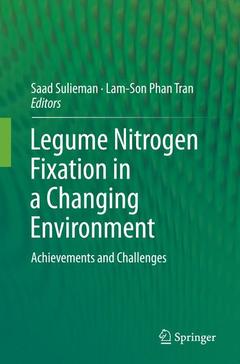Legume Nitrogen Fixation in a Changing Environment, Softcover reprint of the original 1st ed. 2015 Achievements and Challenges
Coordonnateurs : Sulieman Saad, Tran Lam-Son Phan

Dr. Lam-Son Phan Tran is Head of the Signaling Pathway Research Unit at RIKEN Center for Sustainable Resource Science, Japan. He obtained his MSc in Biotechnology in 1994 and PhD in Biological Sciences in 1997 from Szent Istvan University, Hungary. After doing his postdoctoral research at National Food Research Institute (1999-2000) and Nara Institute of Science and Technology of Japan (2001), from October 2001 he joined Japan International Research Center for Agricultural Sciences, to work on functional analysis of transcription factors and osmosensors in stress responses in Arabidopsis. In August 2007 he moved to University of Missouri-Columbia, USA as a Senior Research Scientist to coordinate a research team working on discovery of soybean genes for genetic engineering of drought-tolerant soybean plants. His current research interests are elucidation of the roles of phytohormones and their interactions in abiotic stress responses, as well as translational genomics of legume crops with the aim to enhance crop productivity under adverse environmental conditions. He has published over 80 peer-reviewed papers with more than 60 research and 20 review articles, contributed 7 book chapters to various book editions published by Springer, Wiley-Blackwell, and American Society of Agronomy, Crop Science Society of America and Soil Science Society of America. He has also edited four book volumes for Springer, including this one.
Dr. Saad Sulieman was graduated at the Faculty of Agriculture, University of Khartoum in 1998 with distinction in Agronomy and was awarded many prizes for being the best graduate. He joined the Department of Agronomy, Faculty of Agriculture, University of Khartoum as a Teaching Assistant in 1999. Subsequently, he was trained for MSc in Crop Sciences at the University of Khartoum (2002) and then for PhD in Agricultural Chemistry (2009) at Georg-August University of Göttingen, Germany with a PhD scholarship from German Ac
Up-to-date information on legume-Rhizobium symbiosis
Effects of climate change on crop yields
Solutions to mitigate environmental stresses on nitrogen fixation
Date de parution : 10-2016
Ouvrage de 133 p.
15.5x23.5 cm
Disponible chez l'éditeur (délai d'approvisionnement : 15 jours).
Prix indicatif 105,49 €
Ajouter au panierDate de parution : 05-2015
Ouvrage de 133 p.
15.5x23.5 cm
Disponible chez l'éditeur (délai d'approvisionnement : 15 jours).
Prix indicatif 105,49 €
Ajouter au panier


